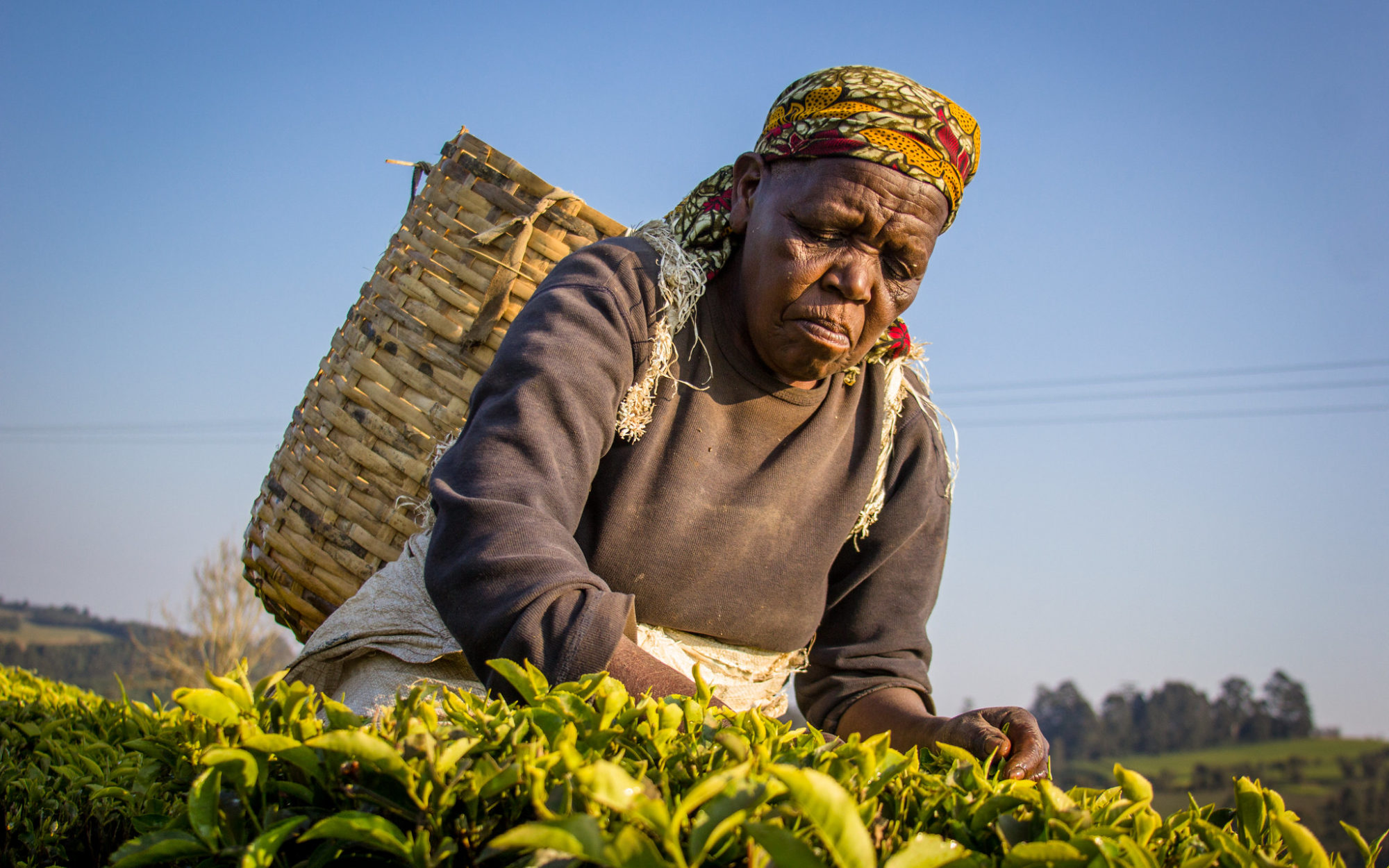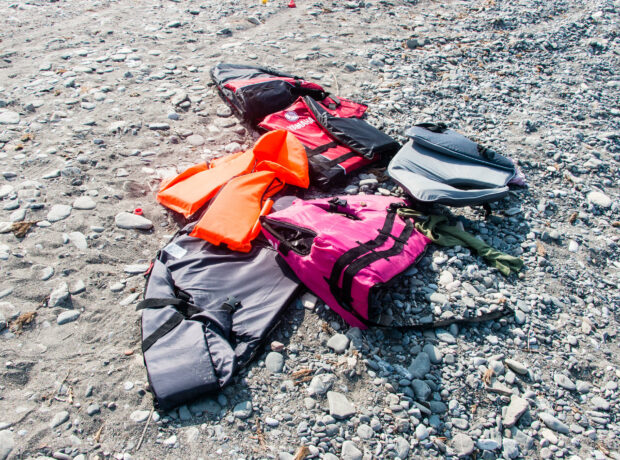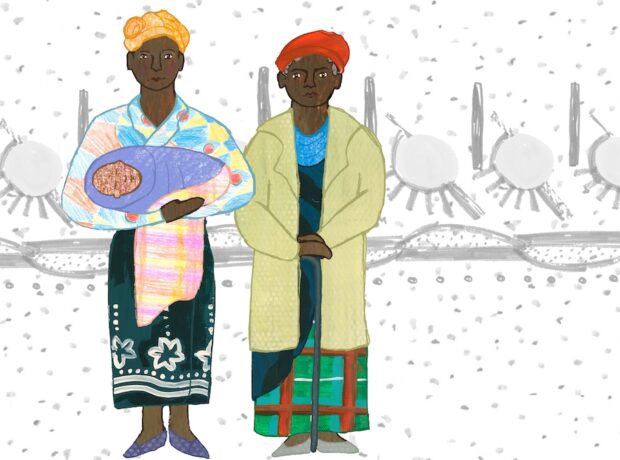When we buy Rainforest Alliance tea what impact are we really having? Dr Marie Pillon travels to Tanzania to speak with tea pickers for one of the world’s largest multinational companies, Unilever, who earn less than the living wage. She discovers that while some lives are transformed by the certification, many workers are still not paid a living wage and struggling for clean water.
Dr Pillon carried out extensive research in Tanzania for her PhD in law, focussed on business and international human rights law. She conducted over 150 interviews and used a sample of them in writing this story to convey her findings.
What difference does choosing a certified product make to people on the other side of the world? Every time I see the green frog of the Rainforest Alliance, I wonder, with a balance of hope and cynicism: does it really have an impact? So, I’m travelling to central Tanzania to visit Unilever’s certified tea plantation, which supplies the firm’s leading tea brand Lipton, to find out what effect a famous label like the Rainforest Alliance can have.
On the 10-hour coach journey from Dar es Salaam, on the Tanzanian coast, to Mufindi, at the heart of the country, I feel the temperature drop as we climb 6,700 feet above sea level. The fact that Mufindi is 10°C cooler makes the region ideal for cultivating tea – and, as I arrive in Mafinga, the largest town in Mufindi, the importance of the tea industry becomes obvious. The factory of Chai Bora, one of the most famous Tanzanian tea brands, sits right in the centre of town, and tea plantations extend all around us. An hour’s drive through woods and cultivated fields brings my translator Zaina and me to our final destination: Unilever’s plantation.
The firm’s estates span thousands of hectares and the opportunity to work for tea companies has been pulling people to Mufindi for decades. As a result, around 6,000 employees work here in Unilever’s plantations and factory in the high season. The multinational achieved Rainforest Alliance certification for its tea operations in Mufindi in 2012.
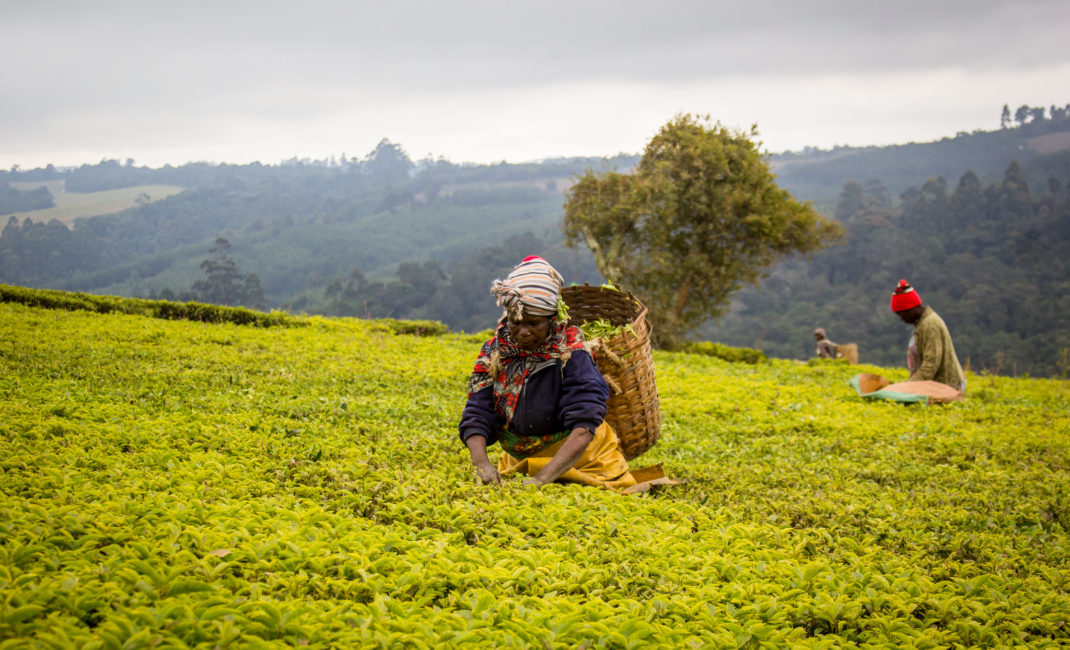
Image by CIFOR (The Center for International Forestry Research) who work with tea pickers in Tanzania.
To accommodate workers and their families, 2,000 homes have been built onsite, and many of the villages in the area are populated by tea workers and their relatives. So when I walk around local communities it’s easy to find workers, and people are happy to talk when I explain I’m interested in hearing about their life in and outside of work.
We meet Odita* in her house, with her grandmother watching us from the corner of a bright and sparsely furnished room. Odita has been working in Unilever’s tea estates for three years. She spends nine months of each year in the plantations, picking tea leaves with her bare hands and throwing them into the hefty basket on her back. The leaves will later be checked for quality (insufficient quality means no pay) and weighed.
As Odita is paid per kilo, she picks as much as she can every day, leaving her hands, back, and chest in pain. Once her 10-hour work day (including a break for lunch) in the plantations is over, she goes to tend to her farm. Although she works six days a week, farming on the side is necessary to survive and support her family.
Odita recalls having to buy her own boots, apron, and basket as the company no longer provides protective equipment for free to seasonal workers (but this is disputed by Unilever below). At the end of our conversation, she looks weary and admits that, because of the difficult working conditions and poor pay, she would like to leave tea work if she could find another source of income. As we say our goodbyes, I wonder if Odita’s story is reflected in the Rainforest Alliance logo on the boxes of tea she has picked, and whether the certification is adequately fulfilling its mission.
It is true that Unilever pays its workers higher than the minimum wage set by the Tanzanian government and has been engaging with workers’ representatives on this issue. The firm also provides its workers with benefits such as free medical care, education and housing, which the company says should count towards living wage calculations. But it is not enough, as tea workers like Odita struggle to make ends meet. The Rainforest Alliance only encourages firms to pay a living wage (estimated to be around £100-a-month for a single adult with no children, almost twice Odita’s pay), but this encouragement does not seem to be pressing enough to move the businesses to take action. Unilever says the cash earnings can be less than the living wage because the living wage includes not just cash earnings but benefits (such as free medical care, education and housing).
An important problem with Rainforest Alliance certification is that even the highest tier of requirements does not require firms to necessarily pay their workers a living wage. Because the Rainforest Alliance operates a ‘pick and choose’ system, as long as firms fulfil at least 50% of these highest requirements, they will achieve or retain certification.
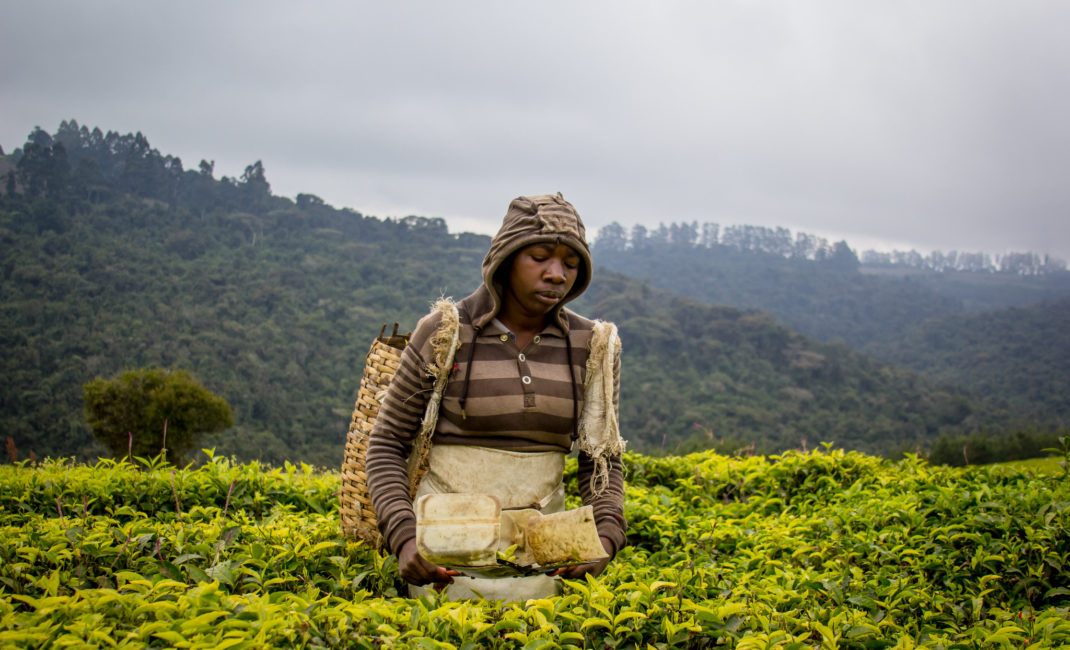
Image by CIFOR (The Center for International Forestry Research) who work with tea pickers in Tanzania.
We meet Titusi* in the nearby town of Kibao. Resting in the shade on the side of the main road, he explains that he is a permanent employee on the tea plantations and he lives onsite in one of the houses provided by the company. Titusi acknowledges that housing is offered to workers for free and that drinking water is available onsite (which is a considerable advantage in the region), but he says living conditions are poor. He and his family live and sleep all in one room, with only a curtain separating the kitchen and bedroom spaces. There is no running water (although this is the norm in the Mufindi region), or electricity. Such conditions are standard across Unilever’s estates, except for a few houses near the factory with access to electricity. Another exception are management houses, as I discover a few days later. As we drive past the management homes I notice the size of the houses and the finely kept private gardens, in contrast to the small houses for workers. Because many workers, like Titusi, are unhappy with the living conditions onsite, some (such as Odita) have decided to find accommodation in the neighbouring villages instead.
Leaving Titusi’s home, we go on to meet Faraya* in her house, sitting atop a hill, overlooking neighbouring aluminium roofs. Faraya is a permanent plantation worker who has been working for Unilever for over five years. She enthusiastically invites us into her darkly lit home and offers us a cup of local tea.
As we sip the hot drink, Faraya explains that, when she needed surgery a few years ago, Unilever sent her to the private hospital onsite and allowed her to recover there for a few weeks, all for free. She stresses what a great benefit to workers (and their families) this is: free health care onsite, delivered at health centres located in each estate and its central hospital equipped with an operating theatre and a maternity ward.
In the context of Mufindi’s crowded public hospitals and general poor access to medication, free healthcare is a precious social benefit offered to workers. This suggests that the Rainforest Alliance – which requires that firms provide free healthcare to workers – is doing something right. This benefit can genuinely make a difference (sometimes between life or death) to the lives of employees. And that’s especially true for workers in regions with limited access to health services.
Before heading back to Mafinga, I walk back through Titusi’s town of Kibao, on the edge of Unilever’s tea estates where I notice piles of opaque plastic containers. After asking members of the community, I learn that they are water bottles, here to be sold to villagers. Trying to understand why this is necessary, I am told that access to water is one of the biggest problems in Mufindi. In Kibao, only two wells are available for a population of 5,000, and the water is not always safe to drink. Those who cannot afford bottled water have to take their chances by drinking from the wells or from the local streams. A few villagers complain to me that they have been asking Unilever for help with this, but that they have received no response from the company.
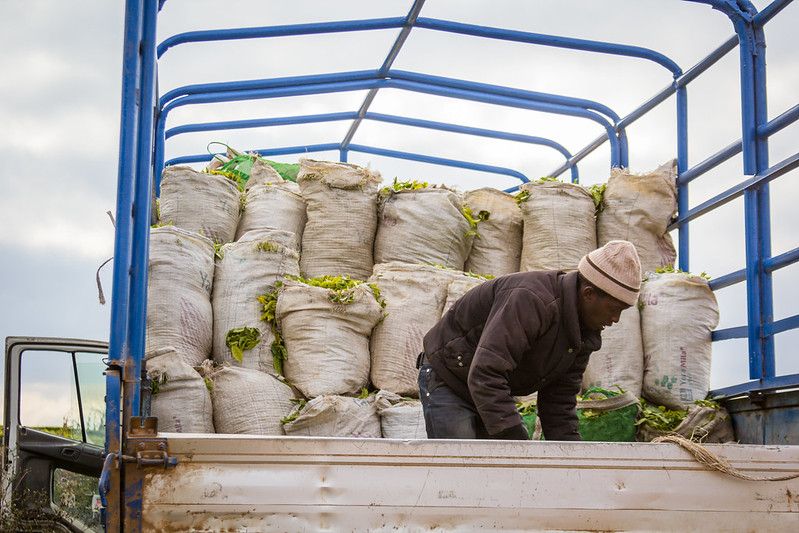
Image by CIFOR (The Center for International Forestry Research) who work with tea pickers in Tanzania.
I leave Mufindi feeling ambivalent about the benefits of a certified tea operation. On the one hand, Unilever offers pay and benefits (as required by the Rainforest Alliance) which are higher than Tanzania’s legal requirements. In particular, the firm’s provision of free healthcare has a tremendously positive impact on workers and their families in a context of limited social services. On the other hand, the Rainforest Alliance does not require the payment of a living wage, and has not compelled the firm to help the community with their poor access to water. It’s clear that despite Unilever’s efforts and the positive influence of Rainforest Alliance, crucial gaps remain. This is especially concerning when these gaps exist under a multinational with an annual turnover of over £46 billion (€52 billion) – one of the companies with the most resources on the planet. If Unilever can’t provide a living wage and access to water, what chance is there for smaller firms without Unilever’s resources?
Returning home from Tanzania, I browse the tea section of my local supermarket back in Coventry, England, and notice how many boxes bear the Rainforest Alliance logo. It brings back memories of the colourful tea plantations of Mufindi, and I feel like I understand a little bit better what it means to buy a certified tea brand. Working and living conditions for tea workers and their families may be better (and sometimes by a long way), but it is still no guarantee that their labour will provide them with fair pay and a decent standard of living. These symbols may help to assuage guilt in the supermarket shopper filling their basket, but there is still a long way to go before they can be seen as a sign of truly ethical consumerism.
Unilever’s UK press office provided the following response:
“Our policy is to provide all workers, temporary or permanent, with free PPE [personal protective equipment], aprons and baskets. We’ve asked management to check immediately that all the estates are complying with this policy. It’s not OK if any are not. That is not the policy and we’ll correct things. Many workers like gumboots, which are popular with farmers but not required PPE. We therefore offer a credit arrangement with a local supplier they can buy on credit at a better price if they wish.
“Worker’s earnings vary as tea plucking is a piece rate job so we can’t comment on an individual case. But the rate for temporary and permanent workers is the same and we negotiate plucking targets for different seasons to ensure wages for day’s work remain in line with the Collective Bargaining Agreement rates. The living wage includes both cash earnings plus benefits, such as free medical care, education and housing. This means the cash portion can be in line with the CBA and above the minimum wage but less in cash terms than the living wage rate.”
The company did not address the lack of response to the villagers who have been asking for help to access clean drinking water but added: “We have extensive community programmes working with local farmers, including our outgrower schemes around Mufindi and Njombe,” citing the following examples:
- https://www.idhsustainabletrade.com/project/mufindi-outgrowers-project/
- https://www.thewoodfoundation.org.uk/venture-philanthropy-in-africa/tanzania/njombe/
- https://www.unilever.com/news/news-and-features/Feature-article/2020/why-were-encouraging-tea-workers-to-eat-more-balanced-diets.html
The Rainforest Alliance responded:
“Our aim is to help certified farmers and supply chain actors discover and bridge the gap between prevailing wages and living wages of agricultural workers. In our 2020 Certification Program – which will be rolled out starting mid 2021 – we are going further to achieve living wages for agricultural workers through the introduction of several innovations that allow farmers to assess the gap to a living wage and measure progress. We’re also promoting a shared responsibility approach that encourages companies to do their part as well.”
*Names have been changed.
All images in this story were taken by CIFOR (The Center for International Forestry Research) who work with tea pickers in Tanzania. CIFOR is a nonprofit global organisation dedicated to advancing human wellbeing enivoronmental conservation and equity. Find out more here.
Read more:
